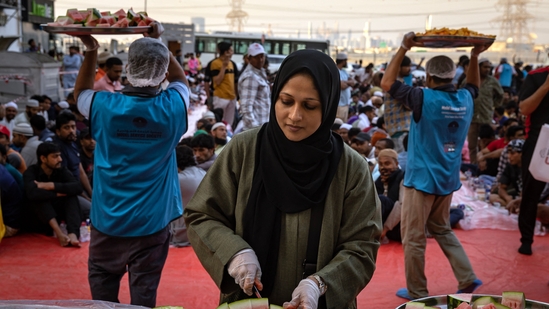Iftar parties fall out UP’s political corridors as power balance evolves
In Lucknow, iftar parties have dwindled since 2017, symbolising changing political dynamics and a shift away from communal harmony events.
Lucknow:

The year is 2017. The Samajwadi Party has just lost the assembly elections to the Bharatiya Janata Party (BJP) and Akhilesh Yadav is still working to establish himself within the party. On June 19, he hosts a grand iftar party at the SP’s office located on Vikaramditya Marg. But the attention of the attendees is neither on the phalanx of political leaders on attendance nor on the food. Instead, the meet was marked by the absence of party patriarch Mulayam Singh Yadav, who chose to attend a rival iftar party hosted by Shivpal Yadav. In the bruising Yadav family feud, the iftar manoeuvre was a decisive signal.
It wasn’t just the Yadavs. Till about a decade ago, the power corridors in Lucknow would be buzzing this time of the year. From Mall Avenue to Vikramaditya Marg, bureaucrats, politicians and ministers would jostle for invitations to one or the other iftar party, the most prestigious beingthe one organised at the chief minister’s official residence on Kalidas Marg.
Along with politicians, the city’s intelligentsia and members of the business community would come together. Political gossip would be exchanged, deals made, signals and hints dropped. Sometimes, a cleverly placed photograph would be enough to set off a political buzz or the rumour of an alliance. During the second half of Ramzan, Lohia Path near the chief minister’s residence was usually clogged with iftar attendees. The six-lane road was converted into a parking area, slowing down traffic on the arterial road.
It started off as a symbolic gesture of solidarity with the Muslim community that was considered the kingmaker at the time, but over time, evolved into political theatre, where attendances and absences were noted keenly.
Also Read: Rahul Gandhi to Nitish Kumar: Politicians who attended Iftar parties this Ramzan | In pics
Today, however, the VIP zone in Lucknow is conspicuously quiet; even the roads leading to the offices of the Samajwadi Party, Bahujan Samaj Party and the Congress are deserted. With Eid round the corner, only the Uttar Pradesh Congress Committee has held an iftar party, on March 23 .
Iftar parties were once held at the CM’s residence when Mulayam Singh Yadav, Akhilesh Yadav, Mayawati, Kalyan Singh and Rajnath Singh were in power. But since 2017, iftar parties have been relegated to the political background. The year 2025 saw only five parties organised by political leaders or parties.
Also Read: Roza Iftars and food walks in Old City are the highlights of Ramzan in Lucknow
“Earlier, the CMs of the Janata Party, Janata Dal, SP, and BSP organised iftar parties at the CM’s official residence when they were in power. Even when BJP’s Kalyan Singh and Rajnath Singh were CMs, iftar parties were organised. However, after BJP formed the government in 2017 and Yogi Adityanath became CM, iftar parties stopped being held at the CM’s residence. Iftar parties were a symbol of Ganga- Jamuni tehzeeb. The BJP government should reorganise them...cutting across party lines, leaders should participate in all festivities,” retired IAS officer Anis Ansari said.
A political tradition
The first big political iftar party was organised by Congress stalwart Hemvati Nandan Bahuguna when he was the CM in 1974.
“Bahuguna organised the iftar party to reach out to the Muslim community and to send a message that the Congress was working for communal harmony,” said a Congress leader on condition of anonymity.
After Bahuguna, iftar parties turned into a political tradition. Congress chief ministers ND Tiwari, VP Singh, Sripati Mishra and Vir Bahadur Singh organised iftar parties at the official CM residence.
When Mulayam Singh Yadav became CM in 1989, he started holding iftar parties at his house. Yadav personally attended to the guests and ensured that the best food was on the menu. Akhilesh Yadav followed in his father’s footsteps, and the iftar party remained an annual affair at the CM’s house. Even the SP ministers organised their separate iftar parties, with supporters from their constituencies visiting the state capital in a show of strength.
But after losing power in 2017, the Samajwadi Party stopped organising iftar at the party’s state unit office on Vikramaditya Marg. “Polarisation politics over iftar parties forced the SP to stop,” said a party leader.
Akhilesh Yadav continues to attend iftar parties organised by party leaders. “The decline in iftar parties by political parties indicates the change in the political landscape of our country,” said Samajwadi Party spokesperson Abdul Hafiz Gandhi.
BSP chief Mayawati organised iftar parties in five-star hotels when she was chief minister. After the BSP lost power in 2012, she stopped hosting the event. Naseemuddin Siddiqui, considered the BSP’s Muslim face, organised it at his residence, but there were no takers after he was expelled inMay, 2017.
The Congress organised iftar at the state headquarters of Nehru Bhavan but stopped during this pandemic. In 2024, it resumed the practice. The party’s state unit held a party its office on March 23 but it was missing the zeal of the past.
Change in custom
The BJP first held an iftar party under Kalyan Singh in 1992. When Ram Prakash Gupta became CM in 1999, he stopped the tradition, which was later revived by Rajnath Singh when he became CM in 2000.
Former UP governor Ram Naik used to organise iftar parties on Raj Bhavan premises between 2014 and 2019. During the tenure of the Janata Party in the state from 1977 to 1980, the then chief ministers Ram Naresh Yadav and Banarsi Das held iftar parties at their official residence. Former prime minister Atal Bihari Vajpayee, who represented Lucknow in Parliament from 1991-2009, also used to organise iftar parties.
In 2017, chief minister Yogi Adityanath, decided not to host an iftar party and also stayed away from Naik’s event. The last time the governor organised it was in 2019.
“The BJP government has not ended the tradition of the iftar party. Rather, it is being hosted by religious and social organisations across the state. The organisation of iftar at the CM’s residence at public expenditure has been stopped,” said BJP state unit spokesperson Rakesh Tripathi.
Some Muslim community leaders decried the loss of the traditional iftar party. “Iftar has been given religious colour whereas earlier it was seen as an event of Hindu-Muslim unity,” said Shia cleric Maulam Yasoob Abbas.
Apart from serving as a stage for the people of different faiths and ideological leanings to come together, the iftar parties also symbolised the changing political equations and dynamics in the state. A year after snubbing his son, Mulayam Singh Yadav returned to attend the iftar hosted by Akhilesh in 2018, signalling a rapprochement in the party and paving the way for his control to expand in the SP.








